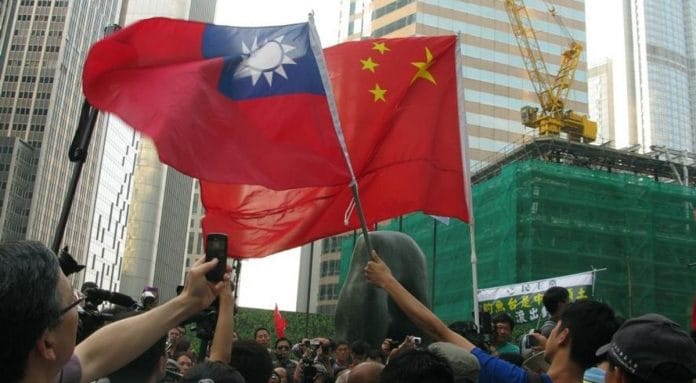China rebuked U.S. efforts to boost Taiwan’s participation in UN organizations, saying the self-ruled island has “no right” to join the world body a half-century after it was booted out.
“The United Nations is an international governmental organization composed of sovereign states,” Ma Xiaoguang, a spokesman for the Taiwan Affairs Office in Beijing, told a regular news briefing Wednesday. “Taiwan is a part of China. The People’s Republic of China is the sole legal government representing the whole of China. Taiwan has no right to join the United Nations.”
Ma was responding to Secretary of State Antony Blinken’s call Tuesday for countries to join the U.S. in pushing to give Taiwan a greater role at the UN. Taiwan should “abandon the illusion of relying on the U.S. for independence,” Ma said.
The Communist Party’s Global Times newspaper separately published an editorial accusing Blinken of trying to upgrade Washington’s approach toward Taipei and opening a “new offensive” on Taiwan. China won’t “step back an inch” on the issue, the Chinese-language edition of the nationalistic tabloid said, arguing that the call would be rejected by most UN members.
While the government in Beijing replaced Taipei’s as China’s representative at the UN in 1971, the Communist Party did for a time allow the island to participate in some international organizations, such as the World Health Organization. Beijing has sought to that roll back since Taiwanese President Tsai Ing-wen was elected in 2016 and refused to accept that both sides are part of “one China.”
“Taiwan’s exclusion undermines the important work of the UN and its related bodies, all of which stand to benefit greatly from its contributions,” Blinken said in a statement. “The fact that Taiwan participated robustly in certain UN specialized agencies for the vast majority of the past 50 years is evidence of the value the international community places in Taiwan’s contributions.”
Taiwan is a critical partner to the United States and a democratic success story. Taiwan should have meaningful participation in the @UN system, especially as we face an unprecedented number of global challenges.
— Secretary Antony Blinken (@SecBlinken) October 26, 2021
Despite the “tens of millions of passengers traveling annually through its airports,” Taiwan wasn’t represented at the International Civil Aviation Organization assembly, Blinken said, adding that Taipei was also absent from the World Health Assembly despite the world having “much to learn” from its pandemic response.
Blinken’s comments come after President Joe Biden said last week the U.S. was committed to defending Taiwan from a Chinese attack, in some of his strongest comments yet as the administration faces calls to clarify its stance on the democratically ruled island. A White House spokesperson later said Biden wasn’t announcing a change in U.S. policy toward Taiwan, which calls for supporting the democracy’s self-defense and opposing unilateral changes in the status quo.
Thank you @SecBlinken for supporting #Taiwan's participation in the @UN system. We will continue to work with the #US & other like-minded partners to overcome the challenges facing the international community.
— 蔡英文 Tsai Ing-wen (@iingwen) October 26, 2021
The Biden administration has struggled to balance the demands of those seeking greater support for Taiwan and others worried about a potential military confrontation with nuclear-armed China. After Biden in August equated the U.S.’s security commitment to Taiwan with its formal alliances with nations such as Japan and South Korea, the administration also clarified that its position was unchanged.
President Xi Jinping took a veiled swipe at Washington’s efforts on Monday, saying in a speech marking the 50th anniversary of the UN shake-up that China “resolutely opposed hegemonism and power politics.” Xi argued that international rules could only be set by the UN’s 193 member states, a group dominated by developing nations with close trade and financial ties to Beijing.
The Biden administration’s push for a greater UN role for Taiwan is one area of continuity with former President Donald Trump. Their efforts mark a departure from predecessors such as former President Bill Clinton, who during a 1998 visit to Shanghai embraced China’s “Three Nos” on Taiwan, saying among other things, that the U.S. doesn’t “believe that Taiwan should be a member in any organization for which statehood is a requirement.”
Subsequent American leaders brought China deeper into traditionally U.S.-led multilateral organizations, with President George W. Bush advocating for its accession into the World Trade Organization in 2001. Many in Washington now argue that the policy failed to spur liberalization in China and express concern that Xi’s campaign to isolate Taiwan might culminate in an effort to take island by force.
During a defense conference Tuesday, Xi called for the establishment of a modern management system for weapons and equipment, while creating a “new situation” for their construction, according to the official Xinhua News Agency. He praised the country’s achievements over the past five years, saying “such progress has served as the material and technological underpinning for the country’s strategic capabilities, military strength in particular.” –Bloomberg
Also read: Xi takes veiled swipe at US as China marks 50 years at UN






